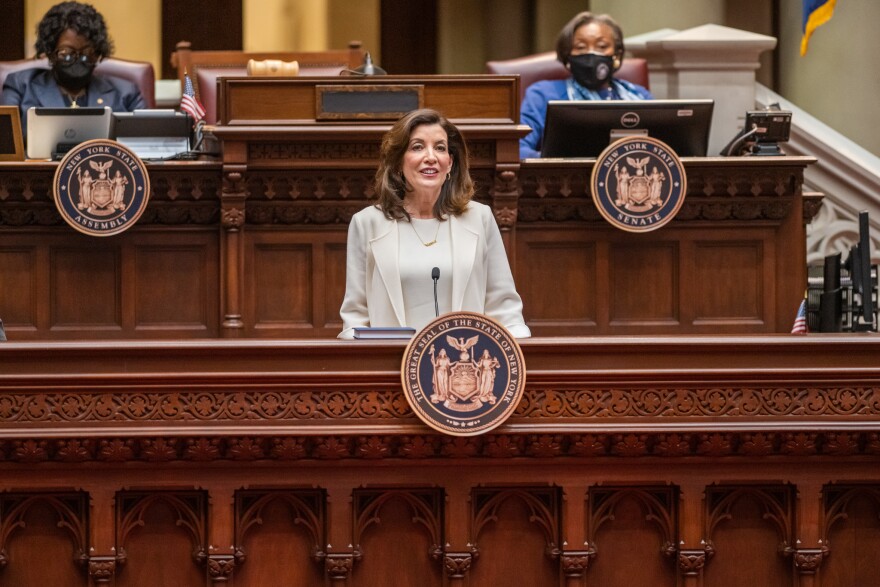ALBANY, NY (WSKG) - New York Gov. Kathy Hochul is expected to provide details on some ambitious spending programs announced earlier this month, when she gives her budget address Tuesday. Budget watchdogs are warning, though, that the governor should also be ready for potential economic downturns in an uncertain time. Hochul begins her first budget season with plenty of cash on hand, due to better than expected sales and income tax collections, and generous federal aid packages during the COVID-19 pandemic. It’s an advantage her immediate predecessors, Andrew Cuomo and David Paterson did not have. They began their terms with multi-billion dollar deficits and prescriptions for fiscal austerity. State Comptroller Tom DiNapoli issues a monthly report on the state’s finances. “She’s in an enviable position,” DiNapoli said. The comptroller found the state took in $12.9 billion more in revenues than initially predicted during the first nine months of the fiscal year. He said part of that is due to tax increases on the wealthy enacted last spring. Also, economic activity has been stronger than expected. “We have had a better revenue stream in recent months than any of us would have anticipated going back over a year ago,” DiNapoli said. “Certainly, even going back to April when the current budget was put in place.” Hochul, in her State of the State message January 5, said she’d like to spend $10 billion on a multiyear plan to support health care workers, including $4 billion in wage increases and bonuses to attract and retain health care professionals. “A once in a life time pandemic demands a once in a life time response,” Hochul said, calling it the “largest investment in health care in the state’s history.” “That’s why I’m setting an ambitious goal to grow our health care workforce by 20% over the next five years,” the governor said. Hochul also proposed a $1 billion property tax rebate, the acceleration of a phased-in middle class tax cut, and tax breaks for small businesses. She also promised to continue a court ordered commitment to add billions of dollars per year in spending to the state’s poorest schools. Budget watchdog groups say the governor should also include plans for better fiscal management. The Citizens Budget Commission’s Patrick Orecki said that includes contributing more to the state’s chronically low rainy day fund, cutting New York’s highest in the nation income taxes, and preparing for the inevitable next economic downturn. “It’s a great opportunity for the state,” said Orecki. “We know that at some point a more typical recession will happen. The state has been chronically inadequately prepared.” Orecki said the governor should keep a close eye on the extra school aid spending, to make sure it is used wisely. And he said Hochul should also reign in economic development programs which have under delivered on promised job creation. Hochul is also facing pressure to spend more on some programs. She’s proposed aid to up to 100,000 families to help pay for child care, but some state lawmakers say the state’s child care system is broken, and it needs a much greater investment. Orecki said the governor should resist pressure to over spend. He said the state is already facing a “fiscal cliff” in 2025, when the federal pandemic relief money runs out. “What does the budget look like in fiscal year 2026 and thereafter, without that federal aid?” he asked. DiNapoli agrees. He said there are still a lot of unknowns in the economy, including rising inflation and how much longer the pandemic will last. “The temptation will be though, we’ve seen this before, to make commitments on spending, not just for when we know we have the money for now, but down the road when we have a lot of uncertainties,” said DiNapoli. He said he does not want to see the state end up with another big budget deficit again.
State surplus will ease New York governor's first budget address


